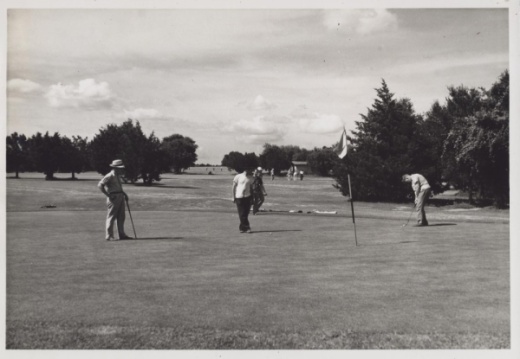When it comes to the Lions Municipal Golf Course, colloquially known as “Muny,” the city and university’s relationship has been fraught, and the decades have brought threats of lease cancellation and use of the course as leverage. With this latest five-month extension, the university and city hope to put the past behind them and forge a partnership that maximizes benefits for both sides.
“We’ve done several [lease] extensions in the past, and we just haven’t gotten any traction on what this broader relationship looks like,” university representative Richard Suttle told City Council. “We have a wonderful opportunity here.”
Muny's complicated history
Austin has leased the golf course from the university since 1937. Since then, Muny, which has been Austin’s most popular municipal course and a beloved West Austin green space, has been used as a valuable bargaining chip by the university when it sought city help on a project. In 1973, UT got the city to fund a costly realignment of Red River Street to make room for the Frank Erwin Center by threatening to cancel the city’s existing lease and sell the course to fund a campus expansion. Credit toward a city purchase of Muny was briefly put on the table last year when UT sought to realign the road again to make room for a new arena and special events center.
In 2006, the UT Board of Regents sought long-term recommendations on how to use the land. With 12 years left in the latest Muny agreement, a task force concluded in 2007 that letting the golf course lease expire and turning the tract into a revenue driver would reap the most benefit for students. Since then, conversations between City Council and UT about how to save the course have started and stalled, but little progress has been made.
In 2016, the local Save Muny organization helped get the course listed on the National Register of Historic Places, against the university’s objection, for being one of the firsts courses in the South to desegregate. During the 2019 legislative session, state Sen. Kirk Watson, D-Austin, created the Save Muny Historic District, a board-appointed committee tasked to explore charging a fee to property owners around Muny that would help fund its preservation. And last year, two-time Masters champion and Austinite Ben Crenshaw started the Save Muny Conservancy, a private philanthropic effort to raise enough money to buy the land from UT and preserve it as a golf course.
A final agreement?
After a one-year extension on the golf course lease last year, city access to Muny, once again, hangs in the balance.
In a January letter to the university, the city said it wanted to reach an agreement with the university that encompasses Muny but also touches on “shared goals” such has affordable housing, open space preservation, and creation and mobility improvement. UT responded in February, saying it wanted, among other things, to expand that list to include “appropriate” density entitlements and permitting help on a handful of UT tracts, traffic improvements near the Wildflower Center and assistance on building 750 graduate housing units near campus.
“A mutually beneficial outcome on these issues along with those raised in your letter could result in the granting of an option to purchase Muny to the Save Historic Muny District at a reasonable value that recognizes the various public purposes and benefits,” the letter said.
Last week, as City Council prepared to agree to the at least five-month extension, the tenor of the conversation had officials excited for true collaboration between the city and university. Mayor Steve Adler said he wanted the relationship between the university and city to be more than “transactional.” District 10 Council Member Alison Alter, who has dealt with the Muny situation since her first day in office in 2017, said she saw a lot of opportunity, and that the sky is the limit on what a true partnership between the city and university could bring.
Council Member Jimmy Flannigan said discussions over Muny have not moved very quickly, and there was broad agreement that the city and university need to close the door on the issue soon. He welcomed the university’s help on housing and said it was time for the entire City Council dais to be involved on the conversation, rather than only a few elected officials.
Suttle said he would work to bring the city a specific proposal from the university on Muny and a what partnership on certain goals should look like before April, when the UT Board of Regents convenes its spring meeting.
In December, Community Impact Newspaper did a deep dive on the situation and history surrounding Muny.





